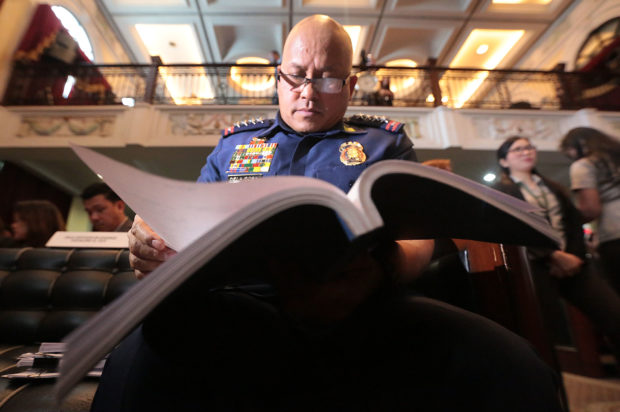
DRUG WAR CASE Philippine National Police Director General Ronald dela Rosa reviews his notes before the start of oral arguments on the Duterte administration’s war on drugs at the Supreme Court on Tuesday. —GRIG C. MONTEGRANDE
There was no explicit order for policemen to execute drug suspects, Philippine National Police Director General Ronald dela Rosa told the Supreme Court on Tuesday as he defended President Rodrigo Duterte’s bloody war on drugs.
At the resumption of oral arguments on two petitions challenging the drug war that has left thousands of Filipinos dead, Solicitor General Jose Calida also said the Supreme Court should reject the petitions, as they were meant to undermine the Duterte administration and foil the efforts of law enforcement agencies to rid the country of illegal drugs.
Destabilization moves
The state’s primary lawyer said the petitioners only wanted to “harass, vex or hinder public authorities in the legitimate exercise of their duties.”
“It is … not difficult to see that the present petitions are disingenuous moves to destabilize the Duterte administration and sow anarchy,” Calida said.
“The court should not let these happen because they will have long-term, catastrophic effects on the nation’s stability and security,” he said.
“The remedies they have resorted to can be considered as a broad plea to strike down prevailing law enforcement practices on dubious constitutional grounds rather than on distinct and personal threats to their lives and safety,” he said.
One of the petitions was a class suit brought by residents of slum communities in San Andres Bukid, Manila, some of whom claimed they had witnessed some of the 35 drug killings in their neighborhood.
The other legal action was lodged by a survivor and relatives of drug suspects killed in police drug raids who were represented by the Free Legal Assistance Group.
Questioned by Associate Justice Marvic Leonen, Dela Rosa maintained that officers on the 160,000-strong force were not specifically instructed to kill suspects in antinarcotics operations.
“Have you ever given a kill order to your men and women? Have you said ‘neutralize’ drug pushers, users and importers?” Leonen asked Dela Rosa.
The PNP chief replied: “‘Neutralize’ has a lot of meaning according to the Police Operational Procedures… It means arrest, have the suspect surrender or kill the suspect in a very extreme situation as a result of legitimate police operations or if there is a gunfight.”
Answering Leonen’s question about directing policemen to kill drug suspects, Dela Rosa said he had “never” issued such an order.
“Never have you meant in any way whatsoever by saying ‘neutralize’ that the police are authorized to kill, is it not correct?” Leonen asked.
“That’s correct, your honor,” Dela Rosa answered.
Leonen also asked Calida if Mr. Duterte himself or Executive Secretary Salvador Medialdea instructed law enforcement agencies to kill drug suspects as part of the government’s campaign against illegal drugs.
“No your honor. There is no kill order,” Calida stressed, adding that the PNP was not involved in the supposed hiring of assassins to kill drug suspects.
‘Inciting disobedience’
Calida also claimed that the petitions “intend to drive a wedge between the President on one hand, and the PNP and DILG (Department of the Interior and Local Government), on the other, inciting disobedience to the Chief Executive and depriving him of his powers and prerogatives.”
He said the petitioners also wanted to “emasculate the government’s police powers by rendering inutile the PNP’s sworn mandate to enforce the law and maintain peace and order.”
“This is the reason why the courts and law enforcement agencies should continue in their relentless campaign not merely to minimize, but to totally eradicate the evil before it is too late,” he said. “The peddlers of drugs are actually agents of destruction. They deserve no less than the maximum penalty.”